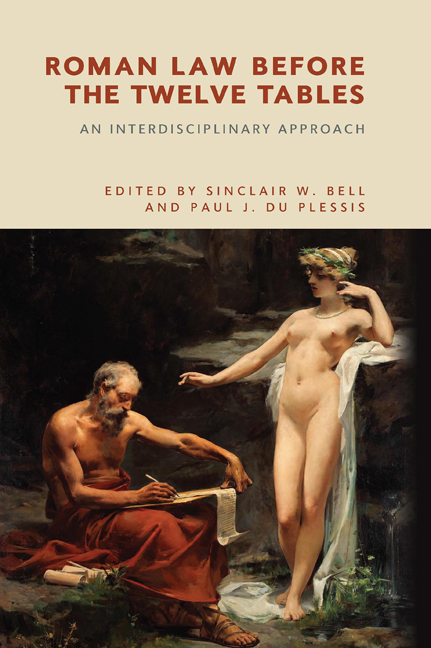Book contents
- Frontmatter
- Contents
- The Contributors
- Introduction: The Dawn of Roman Law
- Part I The Materiality of Roman Law: New Archaeological Discoveries
- 1 Roman Law in its Italic Context
- 2 Central Italian Elite Groups as Aristocratic Houses in the Ninth to Sixth Centuries BCE
- 3 Authority and Display in Sixth-Century Etruria: The Vicchio Stele
- Part II Constructing Early Roman Law: Sources and Methods
- 4 The Twelve Tables and the leges regiae: A Problem of Validity
- 5 The leges regiae in Livy: Narratological and Stylistic Strategies
- 6 The leges regiae through Tradition, Historicity and Invention: A Comparison of Historico-literary and Jurisprudential Sources
- 7 The Laws of the Kings – A View from a Distance
- 8 Beyond the Pomerium: Expansion and Legislative Authority in Archaic Rome
- Part III Roman Law in Historiography and Theory
- 9 Niebuhr and Bachofen: New Forms of Evidence on Roman History
- 10 Finding Melanesia in Ancient Rome: Mauss’ Anthropology of nexum
- Index
5 - The leges regiae in Livy: Narratological and Stylistic Strategies
Published online by Cambridge University Press: 22 September 2020
- Frontmatter
- Contents
- The Contributors
- Introduction: The Dawn of Roman Law
- Part I The Materiality of Roman Law: New Archaeological Discoveries
- 1 Roman Law in its Italic Context
- 2 Central Italian Elite Groups as Aristocratic Houses in the Ninth to Sixth Centuries BCE
- 3 Authority and Display in Sixth-Century Etruria: The Vicchio Stele
- Part II Constructing Early Roman Law: Sources and Methods
- 4 The Twelve Tables and the leges regiae: A Problem of Validity
- 5 The leges regiae in Livy: Narratological and Stylistic Strategies
- 6 The leges regiae through Tradition, Historicity and Invention: A Comparison of Historico-literary and Jurisprudential Sources
- 7 The Laws of the Kings – A View from a Distance
- 8 Beyond the Pomerium: Expansion and Legislative Authority in Archaic Rome
- Part III Roman Law in Historiography and Theory
- 9 Niebuhr and Bachofen: New Forms of Evidence on Roman History
- 10 Finding Melanesia in Ancient Rome: Mauss’ Anthropology of nexum
- Index
Summary
INTRODUCTION
Although the leges regiae are mainly transmitted by Greek sources, Livy in the first book of Ab Urbe Condita records many legislative measures that were issued by kings. These ‘laws’ can be framed in various ways within the context of the kings’ legislative activity. All the passages related to this activity are ordered according to the type of measure considered and are examined from the narratological, lexical, and stylistic point of view, in order to verify what Livy is aiming at by choosing from time to time only certain information offered by the sources and diversifying narrative and rhetorical techniques. It is possible to note that Livy adapts his story not only to the different types of measures considered, but also to the narrative function assigned to each of them. In general, at least two trends can be observed: Livy describes with particular care the sacred formulae of some laws, when he considers that their value is still foundational and exemplary for his time; at the same time, he makes sure to point out all aspects of the content of the law that may appear consistent with the overall portrait of the author of the measure, in order to increase the verisimilitude of the story.
Although much has been written about leges regiae, the topic is still very much debated. It has recently been observed that scholars of Roman law do not agree on whether the kings of Rome have ever legislated in the strict sense, namely according to what would later become the classic notion of lex. Furthermore, it has not so far been possible to draw up a collection of the legislative provisions mentioned by the sources of the regal period which is based on unanimously shared criteria of selection. In a similar way, it has not yet been possible to establish unequivocally what measures, among those attributed to the Roman kings by the sources, should be understood as true leges, especially since it is almost never given to ascertain whether they were approved by the curiae (leges curiatae), or simply imposed on them (leges datae).
- Type
- Chapter
- Information
- Roman Law before the Twelve TablesAn Interdisciplinary Approach, pp. 77 - 96Publisher: Edinburgh University PressPrint publication year: 2020

